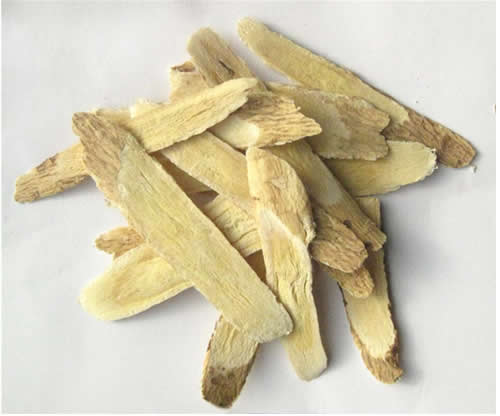Astragalus (Huang chi root) has been used in “Traditional Chinese Medicine” for thousands of years. The human studies on astragalus demonstrate that it can prevent white blood cell numbers from falling in patients given radiotherapy and chemotherapy and can elevate antibody levels in healthy people. Especially, astragalus has been shown to have immunologic benefits by stimulating macrophage and NK (natural killer) cell activity and inhibiting T-helper cell type 2 cytokines.
Astragalus Cancer Cure and Researches
Data from clinical trials are suggestive that astragalus alone and in combination with other herbs may help with the toxic effects of cancer chemotherapy. In a study done with 115 patients on chemotherapy, over 80% showed higher white blood cell counts when taking Astragalus. In the USA, investigators have looked at astragalus as a possible cure for patients whose immune systems have been weakened by chemotherapy or radiation. In these studies, astragalus seem to help patients recover faster and live longer. According to clinical trials from the University of California, Berkeley, Astragalus was shown to increase chemotherapy efficacy and reduce toxicity when combined with platinum-based chemotherapy to improve survival and tumor response for systemic treatments for advanced non–small-cell lung cancer.
In vitro, animal, and anecdotal data show that astragalus decreases immune suppression, a adverse effect of chemotherapy, and may increase the effects of platinum-based chemotherapy. A study done at the “Queen Elizabeth Hospital” examined the in vitro and in vivo antitumor effects of astragalus root. The scientists isolated five bioactive fractions from the root of astragalus – one of the fractions was found to effectively suppress the in vivo growth of syngeneic tumor in mice, and could even partially restore the depressed mitogenic response in tumor-bearing mice. Their study showed that astragalus could exhibit both in vitro and in vivo anti-tumor activities, which might be achieved through activating the anti-tumor immune mechanism of the host.
 In a study of 176 people undergoing chemotherapy for cancers of the gastro-intestinal tract, ginseng and astragalus were able to prevent the normal immune depression and weight loss that occurs. In a variety of human studies, astragalus has been shown to stimulate various parameters of the immune system, has anti-tumor activity, and inhibits the spreading of cancer. In studies, Astragalus polysaccharides were shown to potentiate the immune-mediated antitumor effect of interleukin-2 and the activity of monocytes, improve the responses of lymphocytes from healthy people and cancer patients. The effectiveness of astragalus cure was put to the test in a study of cancer patients undertaken at the M.D. Anderson Cancer Center in Houston in the early 1980s. After giving a specially prepared astragalus extract to 19 cancer patients and 15 healthy people, physicians found that the therapy restored immune system functioning in the majority of the patients.
In a study of 176 people undergoing chemotherapy for cancers of the gastro-intestinal tract, ginseng and astragalus were able to prevent the normal immune depression and weight loss that occurs. In a variety of human studies, astragalus has been shown to stimulate various parameters of the immune system, has anti-tumor activity, and inhibits the spreading of cancer. In studies, Astragalus polysaccharides were shown to potentiate the immune-mediated antitumor effect of interleukin-2 and the activity of monocytes, improve the responses of lymphocytes from healthy people and cancer patients. The effectiveness of astragalus cure was put to the test in a study of cancer patients undertaken at the M.D. Anderson Cancer Center in Houston in the early 1980s. After giving a specially prepared astragalus extract to 19 cancer patients and 15 healthy people, physicians found that the therapy restored immune system functioning in the majority of the patients.
Chinese hospitals give astragalus to strengthen the immune systems of those with cancer, and to preserve them from the harmful effects of chemotherapy and radiation therapy. Astragalus may enhance the effectiveness of chemotherapy medications and speed the healing of patients taking these drugs, according to a research reported in 2002 in the Chinese Journal of Integrated Traditional and Western Medicine. More than 100 Chinese herbal formulas were evaluated for their capability to ameliorate the toxic effects of anticancer agents. A formula including both Ligusticum and astragalus (Shi-Quan-Da-Bu-Tang) was selected as most effective in stimulating hemopoietic factors and interleukin production. In a article reported in Journal of Clinical Oncology in 2006, the authors reviewed different clinical studies and concluded that astragalus might enhance the effectiveness of chemotherapy medications in some cancer patients.
In a clinical study performed at the “China Medical University in Shenyang”, designed to determine the inhibitory activity of astragalus on gastric cancer cells, human peritoneal mesothelial cell was co-incubated with gastric cancer cells and/or astragalus. The findings of this study found that astragalus could partly suppress the apoptosis in the cells. Researchers concluded that astragalus inhibits apoptosis caused by the gastric cancer cells, and can be used in gastric cancer treatment. In China, the Fu-Zheng (astragalus-containing herbal mixture), is commonly used in conjunction with chemotherapy to treat cancer patients. In 2 randomized study of patients with stage II cervical carcinoma and breast carcinoma, those receiving standard radiotherapy plus an Fu-Zheng had increased 10-year survival rates compared with patients receiving radiotherapy alone. A similar survival effect was seen in adults with stage II hepatomas or advanced non-small cell lung cancer receiving standard chemotherapy and radiation plus an Fu-Zheng compared with patients who did ot receive the herbal supplements.
Leave a Reply